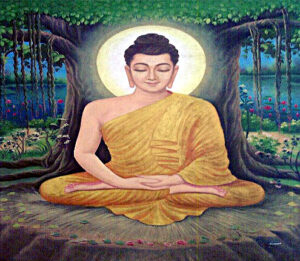Buddhist philosophy refers to the ancient Indian philosophical system of the Buddhist religion. It comprises all the philosophical investigations and systems of inquiry that developed among various schools of Buddhism in ancient India. Buddhism combines both, philosophical reasoning and the practice of meditation. Buddhist religion presents a multitude of Buddhist paths to liberation. Buddhist thinkers have covered topics as varied as cosmology, ethics, logic, metaphysics, ontology, phenomenology, the philosophy of the mind, philosophy of time, and soteriology (the doctrine of salvation), in their analysis of these paths.
 Buddha’s teachings formed the basis of a philosophical tradition that developed and defended a variety of sophisticated theories in Metaphysics (the branch of philosophy that deals with the first principles of things, including abstract concepts such as being, knowing, identity, time and space); and Epistemology (the theory of knowledge, especially in regard to its methods, validity and scope and the distinction between justified belief and opinion).
Buddha’s teachings formed the basis of a philosophical tradition that developed and defended a variety of sophisticated theories in Metaphysics (the branch of philosophy that deals with the first principles of things, including abstract concepts such as being, knowing, identity, time and space); and Epistemology (the theory of knowledge, especially in regard to its methods, validity and scope and the distinction between justified belief and opinion).
Buddha’s teachings, in essence, were extremely simple and universal – these could be as easily practiced as understood. There is no dogma, sectarianism, belief system, religion or prejudice to buy into because it really transcends all that. Its simplicity gives one a sense of real freedom – which is perhaps the reason for its relevance even today, nearly 2,500 years later.
When the Buddha became the enlightened one, he saw the world of people as four distinct groups. According to him there are:
(I) People Running From Darkness To Darkness: These are the people born into difficult situations – family, health concerns, financial woes, political unrest, war, etc. They get objectified, characterized, victimized and bereaved by their situation and circumstance. They are often angry, hurt, bitter. They feel a certain animosity for the world. This tribe pushes and dwells towards more darkness. They run from darkness to darkness never improving either their lot or circumstance. It may be understandable but it prevents them from moving or changing at all.
(II) People Running From Light To Darkness: These are the ones who start with more hopeful and prosperous beginnings – a loving family, good opportunities, surrounded by calm and peace. However, they start running towards darkness for some reason or the other – maybe a sense of entitlement or arrogance in their way of thinking. These people are usually self-made individuals who have worked their way up the ladder – they feel that the rest of the world doesn’t have the smarts and skills that they do, that their views and opinions are superior to the rest. So, they tend to judge, criticize, and convert others to their way of thinking. This unfortunately moves them from a place of light towards darkness.
(III) People Running From Darkness To Light: These are the battle heroes of life, the warriors and the survivors. They often shine with their own light. This tribe, like the first group, are born to darkness – their trials and tribulations have been immense. The odds are stacked against them but they challenge their circumstances and prevail. They change their situation with their thinking. They do not feel victimized, or bereaved by their circumstances. They recognize every thought is a seed for the future. They are determined by the quality of their thoughts to make it. Despite their current circumstances, they endure and endeavor to change it themselves. Theirs is a practice of faith and belief in themselves and the universe to provide the best for them.
(IV) People Running From Light To Lightness: This is the group that born into light – they have prosperous beginnings, a sound family, opportunities, love, abundance. Theirs is a nurturing environment but they do not take it for granted. They realize they are the lucky ones and are entitled, but they choose to do things with their wealth, status and good luck. This is the group of true philanthropes, compassionate and generous at heart. They move from a place of light to light and love.
These four groups of Humankind as per Buddha basically reiterate what many have said, “We are the product of the world we think about most often.” We are born into circumstances and then we have a choice to change. We can either choose to dwell in our environment or we can choose to be its architects.
As humans, we have a responsibility to be mindful of what we think. Thoughts become words. We have to be essentially mindful of what we say since words become actions. Actions, in turn, become habits – good or bad; and this becomes your character. We cannot change our past but we can certainly construct our future. Living in the present, with a mindful presence serves us best. Nothing can harm you as much as your own thoughts unguarded.
Buddha’s teachings preserved in texts known as Nikayas or Agamas, are focused upon the quest for liberation from suffering. He believed that the source of all human suffering basically stemmed from human nature, as well as how we acquired knowledge about the world and our place in it. He said, “To live a pure unselfish life, one must count nothing as one’s own in the midst of abundance.”
- પારૂખ વૃદ્ધાશ્રમમાં ઘણી પ્રતિભા છે કારણ કે તે 2025માં તેના સતશતાબ્દીમાં પ્રવેશ કરે છે! - 11 January2025
- પુણેની આશા વહિસ્તા દાદાગાહે7મી સાલગ્રેહની ઉજવણી કરી - 11 January2025
- ઈરાનના મુખ્ય ધર્મગુરૂ ઈરાની ઝોરાસ્ટ્રિયન અંજુમનના સભ્યોને સંબોધે છે - 11 January2025
